Unit 2 What time do you go to school? Section+A(2a-2d)(共49张PPT)-2022-2023学年七年级英语下册同步精品课堂(人教版)
文档属性
| 名称 | Unit 2 What time do you go to school? Section+A(2a-2d)(共49张PPT)-2022-2023学年七年级英语下册同步精品课堂(人教版) | 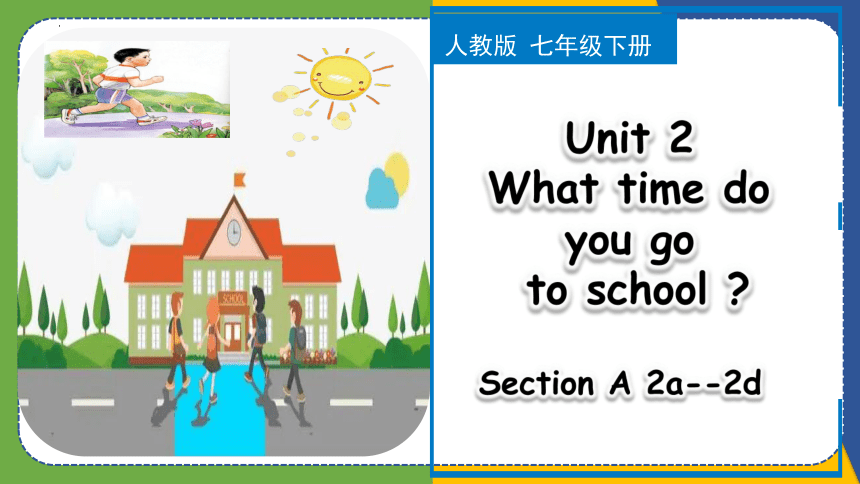 | |
| 格式 | pptx | ||
| 文件大小 | 12.0MB | ||
| 资源类型 | 教案 | ||
| 版本资源 | 人教新目标(Go for it)版 | ||
| 科目 | 英语 | ||
| 更新时间 | 2023-02-15 20:35:36 | ||
图片预览

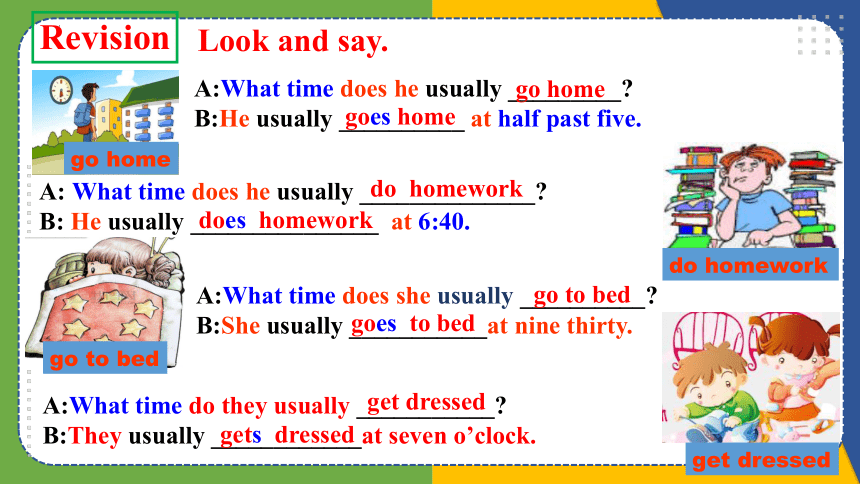

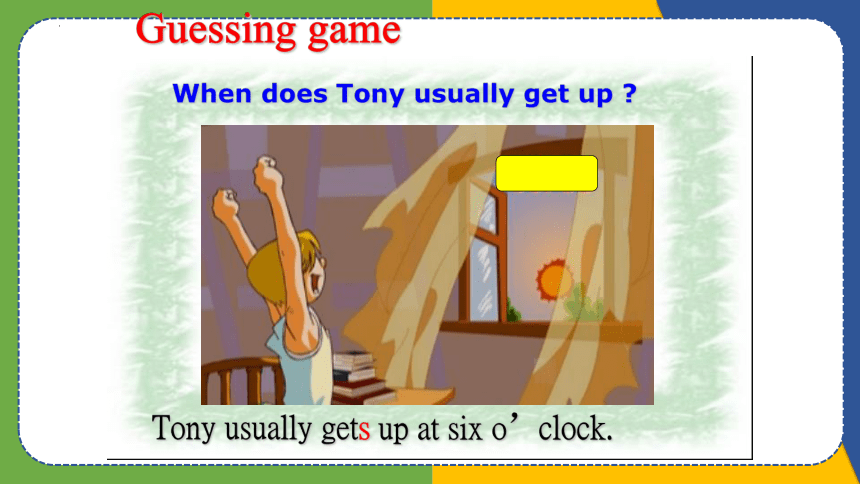
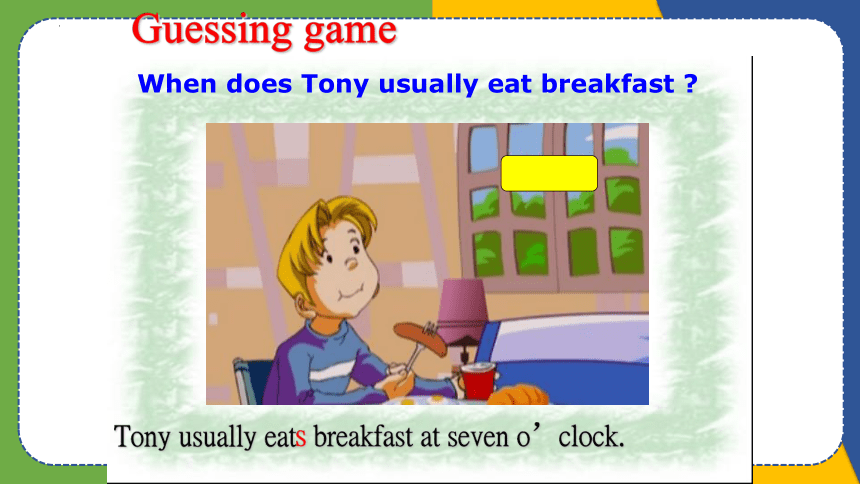
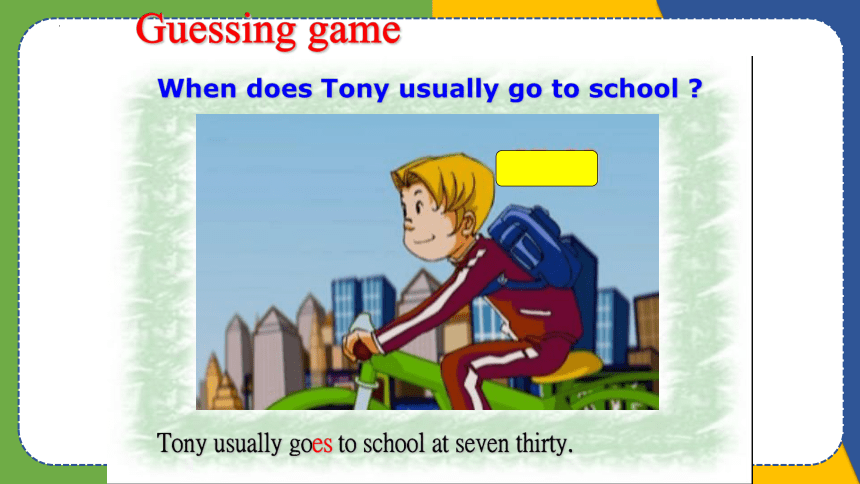
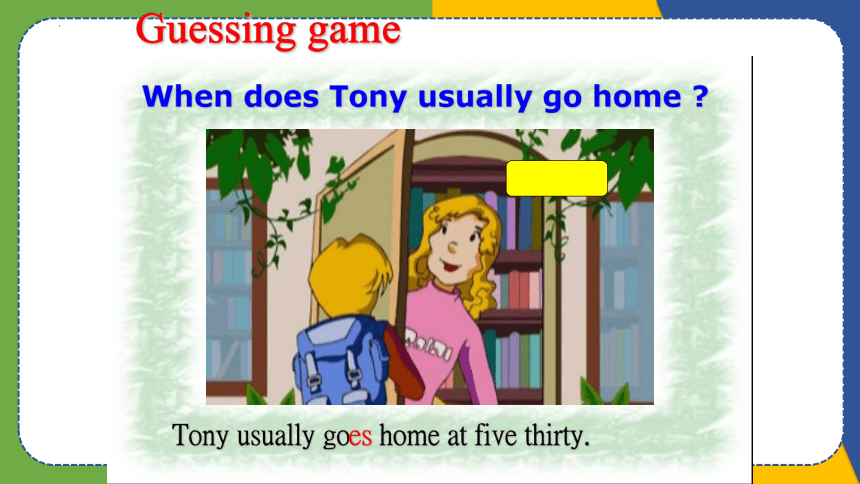
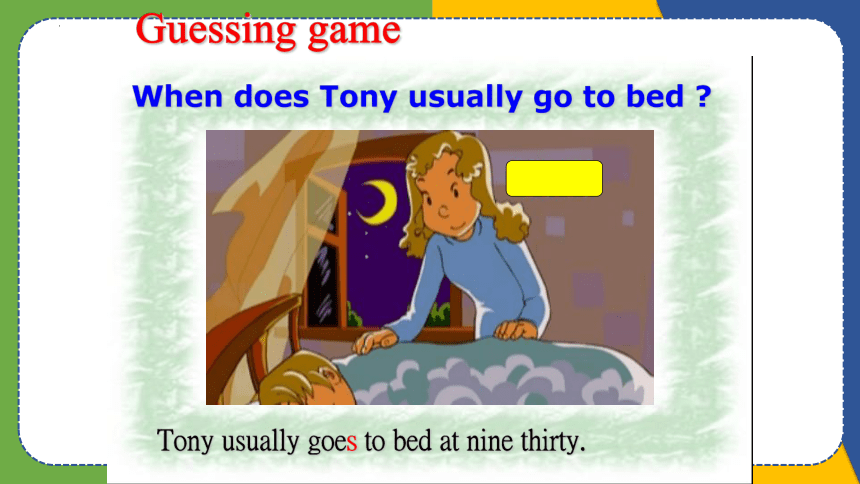
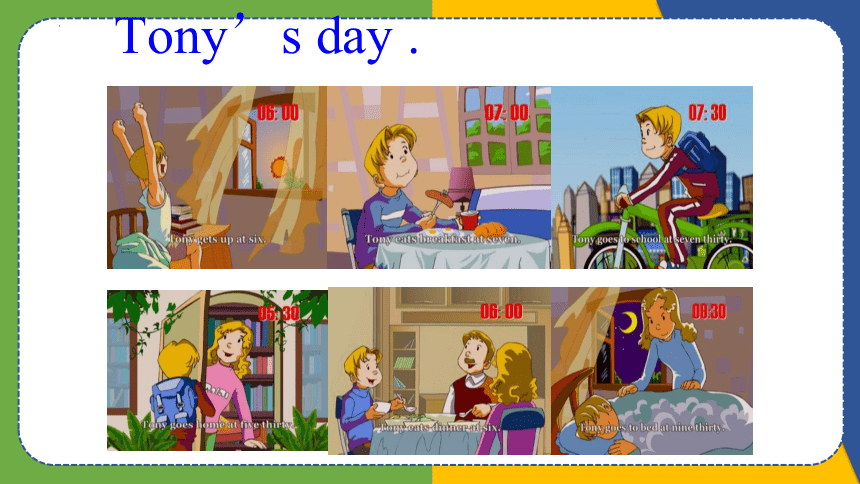
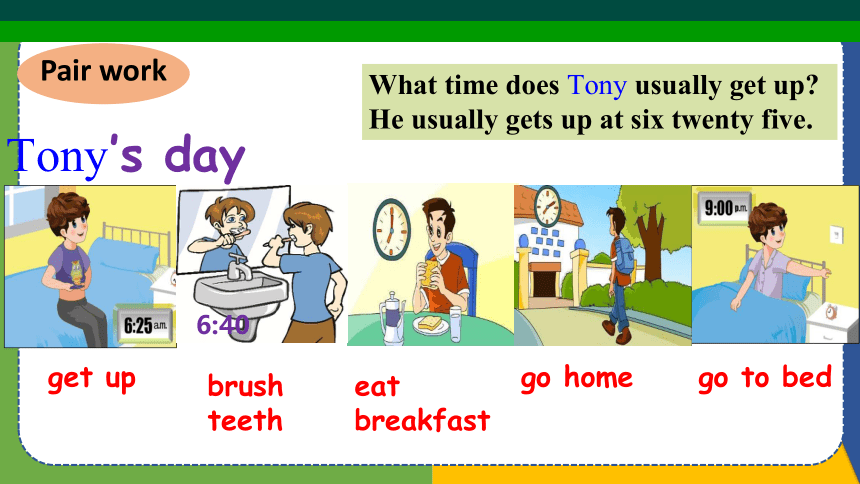

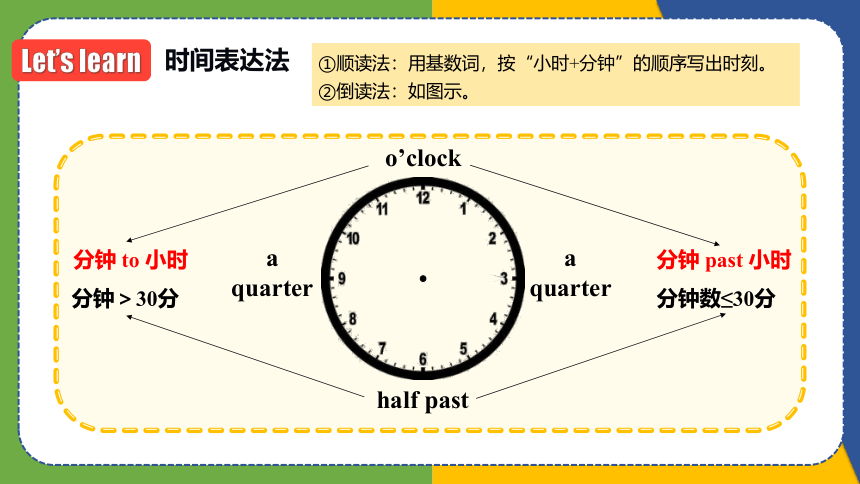
文档简介
(共49张PPT)
人教版 七年级下册
Section A 2a--2d
Unit 2
What time do you go
to school
Presentation
Revision
Look and say.
go home
A:What time does he usually _________
B:He usually __________ at half past five.
go home
goes home
do homework
A: What time does he usually ______________
B: He usually _______________ at 6:40.
do homework
does homework
go to bed
A:What time does she usually __________
B:She usually ___________at nine thirty.
go to bed
goes to bed
get dressed
A:What time do they usually ___________
B:They usually ____________at seven o’clock.
get dressed
gets dressed
01
Lead-in
When does Tony usually get up
Guessing game
Tony usually gets up at six o’clock.
When does Tony usually eat breakfast
Guessing game
Tony usually eats breakfast at seven o’clock.
When does Tony usually go to school
Guessing game
Tony usually goes to school at seven thirty.
When does Tony usually go home
Guessing game
Tony usually goes home at five thirty.
When does Tony usually go to bed
Guessing game
Tony usually goes to bed at nine thirty.
Tony’s day .
Tony’s day
get up
go home
go to bed
Pair work
6:40
brush teeth
eat breakfast
What time does Tony usually get up
He usually gets up at six twenty five.
02
Presentation
时间表达法
Let’s learn
分钟 past 小时
分钟数≤30分
half past
分钟 to 小时
分钟>30分
o’clock
a quarter
a quarter
①顺读法:用基数词,按“小时+分钟”的顺序写出时刻。
②倒读法:如图示。
Presentation
Pre-listening
Look and say.
Presentation
Do you know how to read the time
What time is it (几点了?)
整点时刻表达法:
It's +基数词+o’clock.
It's seven o'clock.
It's five o'clock.
顺读法:
先小时,后分钟,
用基数词,按顺序读出。
It's three twenty-five.
It's five fifty-five.
顺读法:“钟点+分钟”
7点15分 seven fifteen
倒读法:
先分钟,后小时。
分钟数小于和等于30分钟的表达:
分钟+past+小时.
分钟数大于30分钟的表达:
(60-分钟数)+to+(小时数+1).
It's ten to three.
It's four past nine.
It's twenty to
five.
过
Presentation
Pre-listening
Look and say.
Presentation
半点和一刻钟的特殊表达:
30分钟用:half
15分钟用:a quarter
It's a quarter past seven.
It's half past three.
It's a quarter to eight.
9:30 It's nine thirty.
9:30 It's thirty past nine.
9:30 It's half past nine.
It's seven forty-five.
It's fifteen to eight.
It's a quarter to eight.
Presentation
Practice
Look and say.
Pre-listening
get up
A: What time do you usually get up
B: I usually get up at six thirty.
take a shower
A: What time do you usually take a shower
B: I usually take a shower at
six forty.
twenty to seven
half past six
get dressed
A: What time do you usually get dressed
B: I usually get dressed at
six fifty.
ten to seven
Presentation
Practice
Ask and answer.
Post-listening
What time does he usually …
He usually … at ______
get up
take a shower
He usually gets up at six thirty.
He usually takes a shower at six forty.
What time does he usually …
He usually … at ______
What time does he usually …
He usually … at ______
eat breakfast
go to school
get dressed
brush teeth
03
Listening
Presentation
Prediction
Look and say.
Pre-listening
Look at the picture and answer the questions.
1. How many children can you see in the
picture
2. Does Jim have a big family Why do
you think so
3. What does the word “schedule” mean
4. Is it difficult for Jim’s family to take
showers
Four.
Yes. Because Jim has two brothes and two sister.
日程表.
Guess.
Presentation
Listening
Listen and complete.
While-listening
2a
Listen to the conversation and complete the sentences.
Jim has ________brothers and
________sisters. Jim’s family has ______shower.
two
two
one
2b
Listen again. Complete the shower schedule for Jim’s family.
Name Bob Mary Jack Jim Anna
Time 5:30
5:50
6:15
6:30
6:45
做笔记要写关键词,
时间写数字
Jim _______ a big family. He has _______ brothers and two sisters, but they _____ have one shower. Maybe you think it’s _________ for them to take a shower. No, because they have a shower schedule. His brother Bob takes a shower_______ at 5:30.
Fill in the blanks according to the conversation in activity 2b.
has
two
only
difficult
first
while-listening
Listen and follow
Interviewer: You have a big family, don’t you, Jim
Jim: Yes, I have two brothers and two sisters.
Interviewer: Wow! How many showers do you have
Jim: We only have one shower.
Interviewer: Is that difficlut
Jim: No, because we have a shower schedule. My brother Bob takes a shower first at five thirty.
Interviewer: Wow! That’s early!
Jim: Yeah. Then my sister Mary takes a shower at five fifty. Next my brother Jack takes a shower at sis fifteen. I take a shower at six thirty, my sister Anna at six forty-five...
While-listening
04
Pruduction
B
post-listening
Post-listening
Hello, everyone, Jim has a big family. He has 2 brothers and 2 sisters. Here is the shower schedule. Bob takes~
Do a report about jim's shower schedule
Name Bob Mary Jack Jim Anna
Time 5:30
5:50
6:15
6:30
6:45
Presentation
Practice
Ask and answer.
Post-listening
Now talk about yourself according to your time schedule.
Activities Time
get up
take a shower
get dressed
brush teeth
eat breakfast
go to school
Your time schedule
What time do you usually get up
What time do you take a shower
What time do you get dressed
What time do you brush teeth
What time do you usually eat breakfast
When do you go to school
6:10
6:20
6:40
7:00
6:30
6:00
2c
Presentation
Practice
Ask and answer.
Post-listening
Let’s talk about Jim’s family.
A: What time does… take a shower
B: He/She ……
Name Bob Mary Jack Jim Anna
Time 5:30
6:15
6:30
6:45
5:50
Talk about Miss Xu’s Day
— What time does she usually get up
— She usually gets up at six o’ clock am.
Time Activities
6:00 a.m. gets up
7:40 a.m. eats breakfast
8:20 a.m. goes to work
12:30 p.m. have (has) lunch
7:10 p.m. goes home
8:20 p.m. watches TV
9:30 p.m. takes a shower
11:40 p.m. goes to bed
05
Reading
Presentation
Prediction
Look and say.
Post-listening
Look at the picture in 2d and answer the questions.
Where does the man work
He works at a radio station.
/w (r)k/ v. & n.工作 在此作动词
广播电台
station / ste n/
n. 电(视) 台;车站
What’s his job
Perhaps he is a DJ.
He plays music for people.
job /d b/ /d ɑ b/ n.工作;职业
Presentation
Reading
Read and answer.
Post-listening
1. Does Scott have an interesting job
2. Where does he work
3. When does he work
4.Is he often late for work
5. What time does he get up\eat breakfast\ exercise\go to work
6.Does he eat breakfast in the morning or at night
7.What do you think of Scott’s job
Read the conversation in 2d. Answer the questions.
2d
Presentation
Interviewer: Scott has an interesting job. He works at a radio station. Scott,
what time is your radio show
Scott: From twelve o’clock at night to six o’clock in the morning.
Interviewer: What time do you usually get up
Scott: At eight thirty at night. Then I eat breakfast at nine.
Interviewer: That’s a funny time for breakfast!
Scott: Yeah. After that, I usually exercise at about ten twenty.
Interviewer: When do you go to work
Scott: At eleven o’clock, so I’m never late for work.
Reading
Read and answer.
Post-listening
Check your answers.
2d
1. Does Scott have an interesting job
2. Where does he work
3. When does he work
4. When does he work
5.What time does Scott get up
5. What time does Scott eat breakfast
5.What time does Scott exercise
5. What time does Scott go to work
Careful reading
Daily routines
日常作息习惯
Interviewer:
Scott:
Interviewer:
Scott:
Interviewer:
Scott:
Interviewer:
Scott:
an interesting job
Radio station
What time…
12:00 —6:00
What time…get up
at 8:30
breakfast at 9:00
a funny time
exercise at 10:20
When do you go to work
11:00/ never late for work
Presentation
Listening
Listen and fill.
Post-listening
Interviewer: Scott has an interesting _____. He works at a
__________. What time is your radio show
Scott: ______ twelve o’clock at night __ six o’clock in the morning.
Interviewer: _________ do you usually get up
Scott: ___ eight thirty at night. Then I eat breakfast ________.
Interviewer: That’s a funny time _____ breakfast!
Scott: Yeah. _____ that, I usually exercise __ about ten twenty.
Interviewer: ______ do you go to work
Scott: At eleven o’clock, so I’m never late ____ work.
Listen and fill in the blanks.
job
radio station
From
at
What time
At
at nine
for
After
at
When
for
2d
Scott is very busy every day.
He usually ….at…
Then he always…at…
After that, he…at…
He often…at..…
Finally, he…
Interviewer: Scott has an interesting job. He works at a radio station. Scott, what time is your radio show
Scott: From twelve o'clock at night to six o'clock in the morning. Interviewer: What time do you usually get up
Scott: At eight thirty at night. Then I eat breakfast at nine.
Interviewer: That's a funny time for breakfast!
Scott: Yeah. After that, I usually exercise at about ten twenty. Interviewer: When do you go to work
Scott: At eleven o'clock, so I'm never late for work.
What’s one’s job 询问工作或职业
from…to… 从…...至……;从……到……可以用来表示时间,也可以用来表示地点。
本句为what time引导的特殊疑问句,用来询问“某人几点做某事”,结构为“What time+do/does+主语+动词原形+其他 ”,其回答通常用“At+时间点”。
funny 同根词fun,have fun 玩得愉快
exercise one’s body
锻炼身体
be late for 迟到
06
Language points
1. He works at a radio station. 他在一家广播电台工作。(教材P8 2d)
(1) work 在此作不及物动词。worker 是名词,意为“工人”。
Do you work in a school 你是在学校工作吗?
(2) work 还可作不可数名词,指人们在日常生活和工作中从事的体力或脑力劳动,即各类工作。at work 表示“在工作”。
work /w (r)k/ v. & n. 工作
Language points
Language points
【易混辨析】work 与 job
两者作名词,都可意为“工作”,区别如下:
work 不可数名词 泛指抽象意义的工作
job 可数名词 指具体的某种工作或职业
He has a lot of work to do today. 他今天有许多工作要做。
After a long day at work, nothing is better than a good night’s sleep! 工作了一整天,没有什么比睡个好觉更好的了!
Language points
2.From twelve o’clock at night to six o’clock in the morning. 从夜里十二点到早.上六点。(教材P8 2d)
from... to... 从……到……
from... to...可以用来连接两个时间或地点,也可以表示幅度或范围。
We go to school from Monday to Friday. 我们从星期一到星期五上学。(连接两个时间)
Danny goes from Jinan to Wuhan by train. 丹尼乘火车从济南到武汉去。(连接两个地点)
The store sells everything from books to computers. 这家商店出售的商品从书籍到电脑应有尽有。(表示范围)
Language points
I always get up at five fifty. 我总是五点五十起床。
at作为介词,意为“在……”,用来表示时间。其后一般跟表示钟点的词。
例:at 3:00 在3点 at 9:15 在9点15
【辨析】at , in 与 on
(1)介词at常用于时刻前或一些固定的习惯用语中。
at half past ten 在10点半 在夜晚 at night 在中午 at noon
(2)介词in用在月份、季节、年份等前面,也可以表示在上午/下午/晚上。
在上午/下午/晚上 in the morning/afternoon/evening
(3)介词on用在日期、星期几、节日前,也用来表示具体某一天的上午、下午
或晚上。
on November 1st 在11月1日
on Children’s Day 在儿童节
3. After that, I usually exercise at about ten twenty. 在那之后,我通常十点二十左右锻炼(身体)。(教材P8 2d)
exercise在此处作动词,意为“锻炼”。
My grandparents exercise every day. 我的爷爷奶奶天天锻炼身体。
【拓展】exercise还可作名词,常见用法如下:
exercise / eks sa z/ v.& n. 锻炼;练习
exercise n.
不可数名词
可数名词
表示“锻炼;运动”,常和take、 do、 get等词连用
表示“一套动作”或“练习,习题”,如do morning exercises做早操
Language points
We often do exercises in English class. 我们经常在英语课上做练习。
【图解助记】exercise的一词多义:
do/take exercise
做运动;锻炼
do eye exercises
做眼保健操
do math exercises
做数学练习题
Language points
That’s a funny time for breakfast! 那个时间吃早饭真有意思!
time for…表示“做……的时间”
time是名词,意为“时间”。
常用结构:
It’s time for sth. 是做某事的时间。?
It’s time(for sb.)to do sth. 是某人做某事的时间。
相关短语:
at times 有时; in time 及时;
on time 按时;准时。
07
Summary
get up, get dressed, take a shower, radio station,
①What time do you usually get up
I usually get up at six thirty.
②What time does Rick eat breakfast
He eats breakfast at seven o’clock.
③When does Scott go to work
He always goes to work at eleven o’clock.
Useful expressions
Sentences
Key words
up, dress, brush, tooth, shower, usually, forty, wow, never, early, fifty, job, work, station, o’clock, night, funny, exercise
Summary
08
Exercise
Fill in the blanks with the words in box.
at night, be late for, early, at six forty, funny, get up
1. Alice usually _______ at 6:30 in the morning.
2. His uncle works from 10:00 _______ to 6:00 in the morning.
3. His brother never goes to school so _____.
4. The lazy boy __ always _______ school.
5. My sister always takes a shower __________.
6. Look at that boy. He’s really _____.
gets up
at night
early
is late for
at six forty
funny
Exercises
1.他在广播电台工作。
He works ____ ____ _____ _______ .
2.那是有趣的早餐时间!
That’s a _____ ____ ____ breakfast!
3.— 你通常几点起床? — 晚上八点半。
— _____ ____ do you usually ___ ____
— ____ eight thirty ____ ____ .
4.我上班从不迟到。
I’m ____ ____ ____ work.
at
a
radio
station
funny
time
for
What
time
get
up
At
at
night
never
late
for
完成句子
Exercises
单选(每题2分,共10分)
( ) 1. I usually go to school ____ ten .
A. in B. at C. on D. for
( ) 2. I have class ____ night.
A. At B. / C. on D. at
( ) 3. —____ you late ____ school —No, I’m not.
A. Do, for B. Do, of C. Are, for D. Are, of
( ) 4. — Do you usually get up at five
— No, ____ .I usually get up at seven.
A. always B. usually C. never D. often
( ) 5. — ____ do you have breakfast — At 7:30.
A. What B. How C. Where D. What time
B
A
C
C
D
Exercises
用所给词的适当形式填空
1. Mark's brother and he usually _____ (go)
to school at 8:30 .
2. —What time does David _____ (take) a shower?
—He _____ (take) a shower at 7:00.
3. It's a habit to brush our ______ (tooth)
twice a day.
4. Hurry up and get _______ (dress).
5. He likes to do many interesting _____ (job).
goes
take
takes
teeth
dressed
jobs
Exercises
Make a survey then write a short report.
My friend
get up
eat breakfast
go to school
brush teeth
take a shower
get dressed
activity
time
name
Report : I usual get up at … I usually eats breakfast at … … My friend × ×
gets up at …. He\She eats breakfast at…. He\She goes to school at…
I
Homework
人教版 七年级下册
Section A 2a--2d
Unit 2
What time do you go
to school
Presentation
Revision
Look and say.
go home
A:What time does he usually _________
B:He usually __________ at half past five.
go home
goes home
do homework
A: What time does he usually ______________
B: He usually _______________ at 6:40.
do homework
does homework
go to bed
A:What time does she usually __________
B:She usually ___________at nine thirty.
go to bed
goes to bed
get dressed
A:What time do they usually ___________
B:They usually ____________at seven o’clock.
get dressed
gets dressed
01
Lead-in
When does Tony usually get up
Guessing game
Tony usually gets up at six o’clock.
When does Tony usually eat breakfast
Guessing game
Tony usually eats breakfast at seven o’clock.
When does Tony usually go to school
Guessing game
Tony usually goes to school at seven thirty.
When does Tony usually go home
Guessing game
Tony usually goes home at five thirty.
When does Tony usually go to bed
Guessing game
Tony usually goes to bed at nine thirty.
Tony’s day .
Tony’s day
get up
go home
go to bed
Pair work
6:40
brush teeth
eat breakfast
What time does Tony usually get up
He usually gets up at six twenty five.
02
Presentation
时间表达法
Let’s learn
分钟 past 小时
分钟数≤30分
half past
分钟 to 小时
分钟>30分
o’clock
a quarter
a quarter
①顺读法:用基数词,按“小时+分钟”的顺序写出时刻。
②倒读法:如图示。
Presentation
Pre-listening
Look and say.
Presentation
Do you know how to read the time
What time is it (几点了?)
整点时刻表达法:
It's +基数词+o’clock.
It's seven o'clock.
It's five o'clock.
顺读法:
先小时,后分钟,
用基数词,按顺序读出。
It's three twenty-five.
It's five fifty-five.
顺读法:“钟点+分钟”
7点15分 seven fifteen
倒读法:
先分钟,后小时。
分钟数小于和等于30分钟的表达:
分钟+past+小时.
分钟数大于30分钟的表达:
(60-分钟数)+to+(小时数+1).
It's ten to three.
It's four past nine.
It's twenty to
five.
过
Presentation
Pre-listening
Look and say.
Presentation
半点和一刻钟的特殊表达:
30分钟用:half
15分钟用:a quarter
It's a quarter past seven.
It's half past three.
It's a quarter to eight.
9:30 It's nine thirty.
9:30 It's thirty past nine.
9:30 It's half past nine.
It's seven forty-five.
It's fifteen to eight.
It's a quarter to eight.
Presentation
Practice
Look and say.
Pre-listening
get up
A: What time do you usually get up
B: I usually get up at six thirty.
take a shower
A: What time do you usually take a shower
B: I usually take a shower at
six forty.
twenty to seven
half past six
get dressed
A: What time do you usually get dressed
B: I usually get dressed at
six fifty.
ten to seven
Presentation
Practice
Ask and answer.
Post-listening
What time does he usually …
He usually … at ______
get up
take a shower
He usually gets up at six thirty.
He usually takes a shower at six forty.
What time does he usually …
He usually … at ______
What time does he usually …
He usually … at ______
eat breakfast
go to school
get dressed
brush teeth
03
Listening
Presentation
Prediction
Look and say.
Pre-listening
Look at the picture and answer the questions.
1. How many children can you see in the
picture
2. Does Jim have a big family Why do
you think so
3. What does the word “schedule” mean
4. Is it difficult for Jim’s family to take
showers
Four.
Yes. Because Jim has two brothes and two sister.
日程表.
Guess.
Presentation
Listening
Listen and complete.
While-listening
2a
Listen to the conversation and complete the sentences.
Jim has ________brothers and
________sisters. Jim’s family has ______shower.
two
two
one
2b
Listen again. Complete the shower schedule for Jim’s family.
Name Bob Mary Jack Jim Anna
Time 5:30
5:50
6:15
6:30
6:45
做笔记要写关键词,
时间写数字
Jim _______ a big family. He has _______ brothers and two sisters, but they _____ have one shower. Maybe you think it’s _________ for them to take a shower. No, because they have a shower schedule. His brother Bob takes a shower_______ at 5:30.
Fill in the blanks according to the conversation in activity 2b.
has
two
only
difficult
first
while-listening
Listen and follow
Interviewer: You have a big family, don’t you, Jim
Jim: Yes, I have two brothers and two sisters.
Interviewer: Wow! How many showers do you have
Jim: We only have one shower.
Interviewer: Is that difficlut
Jim: No, because we have a shower schedule. My brother Bob takes a shower first at five thirty.
Interviewer: Wow! That’s early!
Jim: Yeah. Then my sister Mary takes a shower at five fifty. Next my brother Jack takes a shower at sis fifteen. I take a shower at six thirty, my sister Anna at six forty-five...
While-listening
04
Pruduction
B
post-listening
Post-listening
Hello, everyone, Jim has a big family. He has 2 brothers and 2 sisters. Here is the shower schedule. Bob takes~
Do a report about jim's shower schedule
Name Bob Mary Jack Jim Anna
Time 5:30
5:50
6:15
6:30
6:45
Presentation
Practice
Ask and answer.
Post-listening
Now talk about yourself according to your time schedule.
Activities Time
get up
take a shower
get dressed
brush teeth
eat breakfast
go to school
Your time schedule
What time do you usually get up
What time do you take a shower
What time do you get dressed
What time do you brush teeth
What time do you usually eat breakfast
When do you go to school
6:10
6:20
6:40
7:00
6:30
6:00
2c
Presentation
Practice
Ask and answer.
Post-listening
Let’s talk about Jim’s family.
A: What time does… take a shower
B: He/She ……
Name Bob Mary Jack Jim Anna
Time 5:30
6:15
6:30
6:45
5:50
Talk about Miss Xu’s Day
— What time does she usually get up
— She usually gets up at six o’ clock am.
Time Activities
6:00 a.m. gets up
7:40 a.m. eats breakfast
8:20 a.m. goes to work
12:30 p.m. have (has) lunch
7:10 p.m. goes home
8:20 p.m. watches TV
9:30 p.m. takes a shower
11:40 p.m. goes to bed
05
Reading
Presentation
Prediction
Look and say.
Post-listening
Look at the picture in 2d and answer the questions.
Where does the man work
He works at a radio station.
/w (r)k/ v. & n.工作 在此作动词
广播电台
station / ste n/
n. 电(视) 台;车站
What’s his job
Perhaps he is a DJ.
He plays music for people.
job /d b/ /d ɑ b/ n.工作;职业
Presentation
Reading
Read and answer.
Post-listening
1. Does Scott have an interesting job
2. Where does he work
3. When does he work
4.Is he often late for work
5. What time does he get up\eat breakfast\ exercise\go to work
6.Does he eat breakfast in the morning or at night
7.What do you think of Scott’s job
Read the conversation in 2d. Answer the questions.
2d
Presentation
Interviewer: Scott has an interesting job. He works at a radio station. Scott,
what time is your radio show
Scott: From twelve o’clock at night to six o’clock in the morning.
Interviewer: What time do you usually get up
Scott: At eight thirty at night. Then I eat breakfast at nine.
Interviewer: That’s a funny time for breakfast!
Scott: Yeah. After that, I usually exercise at about ten twenty.
Interviewer: When do you go to work
Scott: At eleven o’clock, so I’m never late for work.
Reading
Read and answer.
Post-listening
Check your answers.
2d
1. Does Scott have an interesting job
2. Where does he work
3. When does he work
4. When does he work
5.What time does Scott get up
5. What time does Scott eat breakfast
5.What time does Scott exercise
5. What time does Scott go to work
Careful reading
Daily routines
日常作息习惯
Interviewer:
Scott:
Interviewer:
Scott:
Interviewer:
Scott:
Interviewer:
Scott:
an interesting job
Radio station
What time…
12:00 —6:00
What time…get up
at 8:30
breakfast at 9:00
a funny time
exercise at 10:20
When do you go to work
11:00/ never late for work
Presentation
Listening
Listen and fill.
Post-listening
Interviewer: Scott has an interesting _____. He works at a
__________. What time is your radio show
Scott: ______ twelve o’clock at night __ six o’clock in the morning.
Interviewer: _________ do you usually get up
Scott: ___ eight thirty at night. Then I eat breakfast ________.
Interviewer: That’s a funny time _____ breakfast!
Scott: Yeah. _____ that, I usually exercise __ about ten twenty.
Interviewer: ______ do you go to work
Scott: At eleven o’clock, so I’m never late ____ work.
Listen and fill in the blanks.
job
radio station
From
at
What time
At
at nine
for
After
at
When
for
2d
Scott is very busy every day.
He usually ….at…
Then he always…at…
After that, he…at…
He often…at..…
Finally, he…
Interviewer: Scott has an interesting job. He works at a radio station. Scott, what time is your radio show
Scott: From twelve o'clock at night to six o'clock in the morning. Interviewer: What time do you usually get up
Scott: At eight thirty at night. Then I eat breakfast at nine.
Interviewer: That's a funny time for breakfast!
Scott: Yeah. After that, I usually exercise at about ten twenty. Interviewer: When do you go to work
Scott: At eleven o'clock, so I'm never late for work.
What’s one’s job 询问工作或职业
from…to… 从…...至……;从……到……可以用来表示时间,也可以用来表示地点。
本句为what time引导的特殊疑问句,用来询问“某人几点做某事”,结构为“What time+do/does+主语+动词原形+其他 ”,其回答通常用“At+时间点”。
funny 同根词fun,have fun 玩得愉快
exercise one’s body
锻炼身体
be late for 迟到
06
Language points
1. He works at a radio station. 他在一家广播电台工作。(教材P8 2d)
(1) work 在此作不及物动词。worker 是名词,意为“工人”。
Do you work in a school 你是在学校工作吗?
(2) work 还可作不可数名词,指人们在日常生活和工作中从事的体力或脑力劳动,即各类工作。at work 表示“在工作”。
work /w (r)k/ v. & n. 工作
Language points
Language points
【易混辨析】work 与 job
两者作名词,都可意为“工作”,区别如下:
work 不可数名词 泛指抽象意义的工作
job 可数名词 指具体的某种工作或职业
He has a lot of work to do today. 他今天有许多工作要做。
After a long day at work, nothing is better than a good night’s sleep! 工作了一整天,没有什么比睡个好觉更好的了!
Language points
2.From twelve o’clock at night to six o’clock in the morning. 从夜里十二点到早.上六点。(教材P8 2d)
from... to... 从……到……
from... to...可以用来连接两个时间或地点,也可以表示幅度或范围。
We go to school from Monday to Friday. 我们从星期一到星期五上学。(连接两个时间)
Danny goes from Jinan to Wuhan by train. 丹尼乘火车从济南到武汉去。(连接两个地点)
The store sells everything from books to computers. 这家商店出售的商品从书籍到电脑应有尽有。(表示范围)
Language points
I always get up at five fifty. 我总是五点五十起床。
at作为介词,意为“在……”,用来表示时间。其后一般跟表示钟点的词。
例:at 3:00 在3点 at 9:15 在9点15
【辨析】at , in 与 on
(1)介词at常用于时刻前或一些固定的习惯用语中。
at half past ten 在10点半 在夜晚 at night 在中午 at noon
(2)介词in用在月份、季节、年份等前面,也可以表示在上午/下午/晚上。
在上午/下午/晚上 in the morning/afternoon/evening
(3)介词on用在日期、星期几、节日前,也用来表示具体某一天的上午、下午
或晚上。
on November 1st 在11月1日
on Children’s Day 在儿童节
3. After that, I usually exercise at about ten twenty. 在那之后,我通常十点二十左右锻炼(身体)。(教材P8 2d)
exercise在此处作动词,意为“锻炼”。
My grandparents exercise every day. 我的爷爷奶奶天天锻炼身体。
【拓展】exercise还可作名词,常见用法如下:
exercise / eks sa z/ v.& n. 锻炼;练习
exercise n.
不可数名词
可数名词
表示“锻炼;运动”,常和take、 do、 get等词连用
表示“一套动作”或“练习,习题”,如do morning exercises做早操
Language points
We often do exercises in English class. 我们经常在英语课上做练习。
【图解助记】exercise的一词多义:
do/take exercise
做运动;锻炼
do eye exercises
做眼保健操
do math exercises
做数学练习题
Language points
That’s a funny time for breakfast! 那个时间吃早饭真有意思!
time for…表示“做……的时间”
time是名词,意为“时间”。
常用结构:
It’s time for sth. 是做某事的时间。?
It’s time(for sb.)to do sth. 是某人做某事的时间。
相关短语:
at times 有时; in time 及时;
on time 按时;准时。
07
Summary
get up, get dressed, take a shower, radio station,
①What time do you usually get up
I usually get up at six thirty.
②What time does Rick eat breakfast
He eats breakfast at seven o’clock.
③When does Scott go to work
He always goes to work at eleven o’clock.
Useful expressions
Sentences
Key words
up, dress, brush, tooth, shower, usually, forty, wow, never, early, fifty, job, work, station, o’clock, night, funny, exercise
Summary
08
Exercise
Fill in the blanks with the words in box.
at night, be late for, early, at six forty, funny, get up
1. Alice usually _______ at 6:30 in the morning.
2. His uncle works from 10:00 _______ to 6:00 in the morning.
3. His brother never goes to school so _____.
4. The lazy boy __ always _______ school.
5. My sister always takes a shower __________.
6. Look at that boy. He’s really _____.
gets up
at night
early
is late for
at six forty
funny
Exercises
1.他在广播电台工作。
He works ____ ____ _____ _______ .
2.那是有趣的早餐时间!
That’s a _____ ____ ____ breakfast!
3.— 你通常几点起床? — 晚上八点半。
— _____ ____ do you usually ___ ____
— ____ eight thirty ____ ____ .
4.我上班从不迟到。
I’m ____ ____ ____ work.
at
a
radio
station
funny
time
for
What
time
get
up
At
at
night
never
late
for
完成句子
Exercises
单选(每题2分,共10分)
( ) 1. I usually go to school ____ ten .
A. in B. at C. on D. for
( ) 2. I have class ____ night.
A. At B. / C. on D. at
( ) 3. —____ you late ____ school —No, I’m not.
A. Do, for B. Do, of C. Are, for D. Are, of
( ) 4. — Do you usually get up at five
— No, ____ .I usually get up at seven.
A. always B. usually C. never D. often
( ) 5. — ____ do you have breakfast — At 7:30.
A. What B. How C. Where D. What time
B
A
C
C
D
Exercises
用所给词的适当形式填空
1. Mark's brother and he usually _____ (go)
to school at 8:30 .
2. —What time does David _____ (take) a shower?
—He _____ (take) a shower at 7:00.
3. It's a habit to brush our ______ (tooth)
twice a day.
4. Hurry up and get _______ (dress).
5. He likes to do many interesting _____ (job).
goes
take
takes
teeth
dressed
jobs
Exercises
Make a survey then write a short report.
My friend
get up
eat breakfast
go to school
brush teeth
take a shower
get dressed
activity
time
name
Report : I usual get up at … I usually eats breakfast at … … My friend × ×
gets up at …. He\She eats breakfast at…. He\She goes to school at…
I
Homework
同课章节目录
- Unit 1 Can you play the guitar?
- Section A
- Section B
- Unit 2 What time do you go to school?
- Section A
- Section B
- Unit 3 How do you get to school?
- Section A
- Section B
- Unit 4 Don't eat in class.
- Section A
- Section B
- Unit 5 Why do you like pandas?
- Section A
- Section B
- Unit 6 I'm watching TV.
- Section A
- Section B
- Review of Units 1-6
- Unit 7 It's raining!
- Section A
- Section B
- Unit 8 Is there a post office near here?
- Section A
- Section B
- Unit 9 What does he look like?
- Section A
- Section B
- Unit 10 I'd like some noodles.
- Section A
- Section B
- Unit 11 How was your school trip?
- Section A
- Section B
- Unit 12 What did you do last weekend?
- Section A
- Section B
